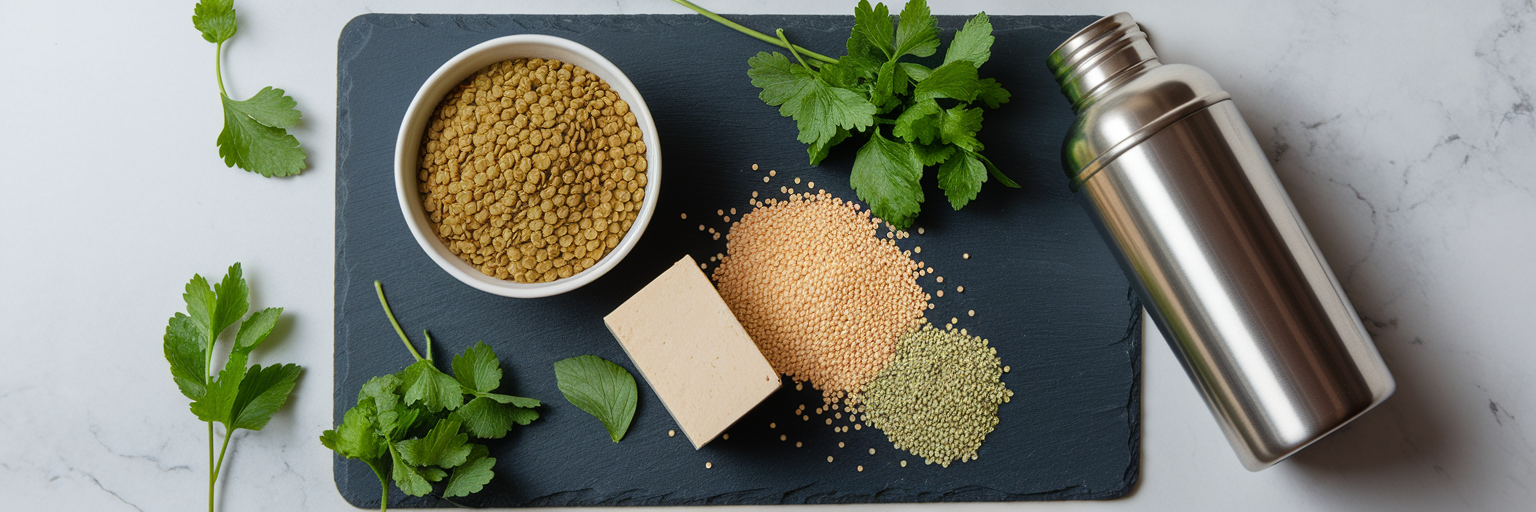For decades, the fitness world has held a firm belief that building serious muscle requires dairy-based proteins like whey. This idea is so ingrained that choosing a plant-based path can feel like you are compromising on your goals. But the science of muscle growth tells a different story. It is not about the source, but about the building blocks it provides. With the right approach, you can absolutely build muscle on a vegan diet without sacrificing performance.
The Amino Acid Advantage of Plant Proteins
Muscle growth is a process of repair. After a workout, your muscle fibres need to rebuild, and the materials they use are amino acids. To trigger this repair effectively, your body requires all nine essential amino acids, which it cannot produce on its own. This is where the old myth about "incomplete" plant proteins often causes confusion. The concern was that a single plant source might be low in one or two of these essential building blocks.
However, this view is outdated. A well-planned plant-based diet easily provides a complete amino acid profile vegan athletes can depend on. Think of it like building with different types of bricks. Combining legumes with grains, or seeds with vegetables, ensures you have every component needed for strong, resilient muscle. It is a simple strategy of dietary diversity that plant-based eaters have used for generations.
Within this profile, the Branched-Chain Amino Acids (BCAAs) play a particularly important role. Leucine, one of these BCAAs, acts as the primary switch that activates muscle protein synthesis. This is where certain plant proteins truly shine. Pea protein, for instance, is naturally rich in leucine, making it a powerful and effective choice for post-workout recovery. The evidence is clear: plant-based nutrition is not a barrier to muscle growth but a scientifically sound foundation for it.
Understanding Absorption Rates and Muscle Repair

Now that we have established the importance of a complete amino acid profile, the conversation often shifts to absorption speed. The pea protein vs whey debate is a perfect example. Whey is famous for its rapid absorption, delivering a quick spike of amino acids to your muscles. While this is beneficial, it is not the only effective approach to muscle repair.
Plant-based proteins, like those from peas or rice, tend to be absorbed more slowly. This might sound like a disadvantage, but it offers a unique benefit: a sustained release of amino acids. Instead of a quick flood, your muscles receive a steady supply of nourishment over several hours. This prolonged delivery can help reduce muscle breakdown long after your workout is over, supporting continuous recovery. It is less like a flash flood and more like a steady, nourishing rain.
Furthermore, modern processing has significantly improved the digestibility of plant protein isolates, making them highly bioavailable. According to a study published in the Journal of the International Society of Sports Nutrition, pea protein was found to promote muscle growth to a similar degree as whey when total protein intake was adequate. This highlights a crucial point: what matters most is consuming enough total protein throughout the day, not just the speed of one shake. When you are looking for a supplement, you can find some of the best protein powders that are specifically formulated to deliver these benefits without the digestive discomfort that lactose can cause.
| Factor | Plant-Based Protein (e.g., Pea/Rice Blend) | Whey Protein |
|---|---|---|
| Absorption Speed | Slower, more sustained release | Rapid, causing a quick amino acid spike |
| Muscle Nourishment | Provides a steady supply of amino acids over hours | Delivers a fast initial burst for immediate repair |
| Digestibility | High in fibre; generally easy on the gut for most | Can cause bloating or digestive issues due to lactose |
| Allergen Profile | Free from common allergens like dairy and soy (depending on source) | Contains lactose, a common allergen and irritant |
This table compares the general characteristics of plant-based and whey proteins. The choice depends on individual goals, digestive tolerance, and dietary preferences, with both being effective for muscle synthesis when intake is adequate.
Proven Success in Plant-Based Athletics
The science is compelling, but the real proof is in the performance. We are seeing more elite athletes than ever before not just competing, but dominating their sports while following a completely plant-based diet. Their success is not an accident. It is built on a foundation of strategic nutrition, proving that you can achieve peak physical condition without animal products.
These athletes understand that building muscle is about consistency and planning. They achieve this by eating a diverse range of plant foods to cover all their nutritional bases. For those with demanding training schedules and high protein needs, a clean, high-quality vegan protein powder becomes an indispensable tool. It offers an efficient and reliable way to hit daily protein targets, accelerate recovery, and support lean muscle development.
This demonstrates that the plant based protein benefits go far beyond personal ethics or environmental concerns. They translate into tangible results in strength, endurance, and overall performance. It is a powerful shift that shows a plant-powered approach is not a compromise but a competitive advantage. For anyone looking to support their fitness journey, our range of products is designed to help you meet these goals effectively.
Optimising Your Plant-Powered Muscle Growth

Knowing that plant-based protein works is the first step. The next is putting that knowledge into practice. Building muscle effectively requires a thoughtful approach to your diet and training. Here are four actionable steps to help you get the most out of your plant-powered routine and maximise vegan protein for muscle growth.
- Diversify Your Protein Sources: Do not rely on just one or two foods. A varied diet is your best strategy for getting a full spectrum of amino acids. Incorporate some of the best vegan protein sources like lentils, chickpeas, quinoa, tofu, tempeh, and hemp seeds into your daily meals. For practical ideas, you can explore some of our easy-to-follow recipes that make integrating these foods simple and delicious.
- Master Protein Timing: While total daily intake is key, timing can give you an edge. Aim to consume a protein-rich meal or shake within a few hours after your workout to kickstart the recovery process. Equally important is distributing your protein intake evenly throughout the day. This helps maintain a consistent state of muscle protein synthesis, preventing muscle breakdown between meals.
- Ensure Sufficient Calorie Intake: Muscle growth is an energy-intensive process. You need to be in a slight caloric surplus to give your body the fuel it needs to build new tissue. Plant-based diets are naturally high in fibre, which can make you feel full. Be mindful of this and ensure you are eating enough calories to support your training intensity and growth goals.
- Choose Your Protein Powder Strategically: A high-quality supplement can fill any nutritional gaps and make hitting your protein targets much easier. Look for a powder that provides 20-25 grams of protein per serving and is rich in leucine. For example, a clean chocolate vegan protein can be a perfect post-workout choice that supports recovery while satisfying your taste buds.
Overcoming Common Plant-Based Hurdles
Transitioning to a plant-based diet for fitness can sometimes come with questions or concerns. It is important to address these directly, as they are often based on misinformation. With a little knowledge, these potential hurdles become simple aspects of a well-managed nutritional plan.
One common concern is about "anti-nutrients" like phytates, which are compounds found in plant foods that can slightly reduce mineral absorption. However, this is rarely an issue in a balanced diet. Standard food preparation methods like soaking, sprouting, and cooking significantly reduce their presence. The benefits of consuming these nutrient-dense whole foods far outweigh any minimal effects of anti-nutrients.
It is also wise to be mindful of a few key micronutrients that are less abundant in plant foods, such as Vitamin B12, Vitamin D, and iron. These are crucial for overall health, energy levels, and oxygen transport, all of which support your fitness performance. A simple blood test can check your levels, and supplementation is an easy and effective way to ensure you are not deficient.
These points are not barriers but simply things to be aware of. A well-planned vegan diet, supported by high-quality supplementation, can fully sustain any fitness goal. If you have more specific questions about ingredients or formulations, you can find detailed answers on our dedicated FAQ page.



